The AMD 2nd Gen Ryzen Deep Dive: The 2700X, 2700, 2600X, and 2600 Tested
by Ian Cutress on April 19, 2018 9:00 AM ESTCPU Encoding Tests
One of the interesting elements on modern processors is encoding performance. This includes encryption/decryption, as well as video transcoding from one video format to another. In the encrypt/decrypt scenario, this remains pertinent to on-the-fly encryption of sensitive data - a process by which more modern devices are leaning to for software security. Video transcoding as a tool to adjust the quality, file size and resolution of a video file has boomed in recent years, such as providing the optimum video for devices before consumption, or for game streamers who are wanting to upload the output from their video camera in real-time. As we move into live 3D video, this task will only get more strenuous, and it turns out that the performance of certain algorithms is a function of the input/output of the content.
All of our benchmark results can also be found in our benchmark engine, Bench.
7-Zip 9.2: link
One of the freeware compression tools that offers good scaling performance between processors is 7-Zip. It runs under an open-source licence, is fast, and easy to use tool for power users. We run the benchmark mode via the command line for four loops and take the output score.
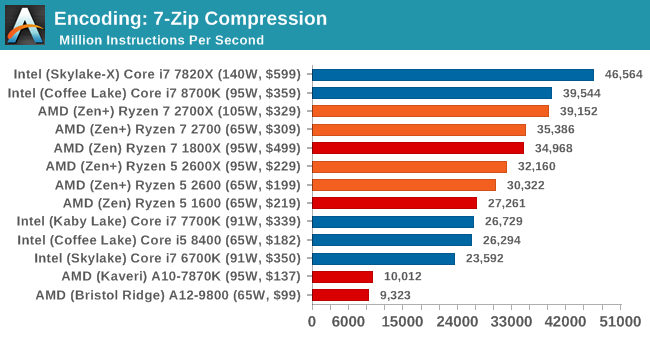
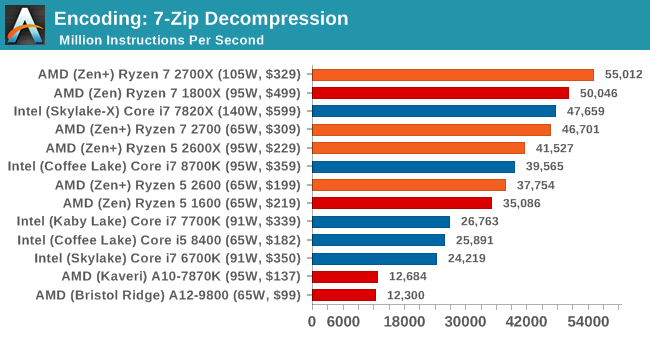
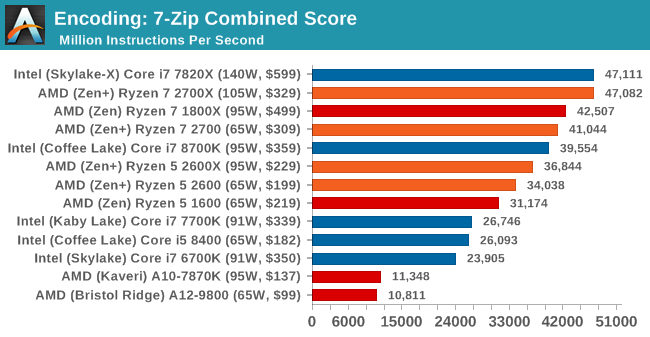
WinRAR 5.40: link
For the 2017 test suite, we move to the latest version of WinRAR in our compression test. WinRAR in some quarters is more user friendly that 7-Zip, hence its inclusion. Rather than use a benchmark mode as we did with 7-Zip, here we take a set of files representative of a generic stack (33 video files in 1.37 GB, 2834 smaller website files in 370 folders in 150 MB) of compressible and incompressible formats. The results shown are the time taken to encode the file. Due to DRAM caching, we run the test 10 times and take the average of the last five runs when the benchmark is in a steady state.
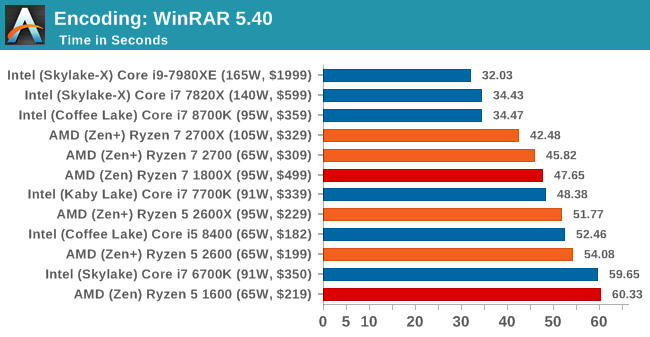
WinRAR requires a good memory base, so we see the quad-channel processors heading up the pack. The high IPC of the Core i7-8700K also does well.
AES Encoding
Algorithms using AES coding have spread far and wide as a ubiquitous tool for encryption. Again, this is another CPU limited test, and modern CPUs have special AES pathways to accelerate their performance. We often see scaling in both frequency and cores with this benchmark. We use the latest version of TrueCrypt and run its benchmark mode over 1GB of in-DRAM data. Results shown are the GB/s average of encryption and decryption.
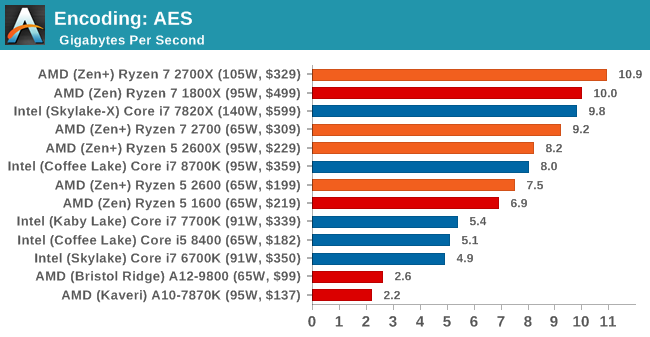
HandBrake v1.0.2 H264 and HEVC: link
As mentioned above, video transcoding (both encode and decode) is a hot topic in performance metrics as more and more content is being created. First consideration is the standard in which the video is encoded, which can be lossless or lossy, trade performance for file-size, trade quality for file-size, or all of the above can increase encoding rates to help accelerate decoding rates. Alongside Google's favorite codec, VP9, there are two others that are taking hold: H264, the older codec, is practically everywhere and is designed to be optimized for 1080p video, and HEVC (or H265) that is aimed to provide the same quality as H264 but at a lower file-size (or better quality for the same size). HEVC is important as 4K is streamed over the air, meaning less bits need to be transferred for the same quality content.
Handbrake is a favored tool for transcoding, and so our test regime takes care of three areas.
Low Quality/Resolution H264: Here we transcode a 640x266 H264 rip of a 2 hour film, and change the encoding from Main profile to High profile, using the very-fast preset.
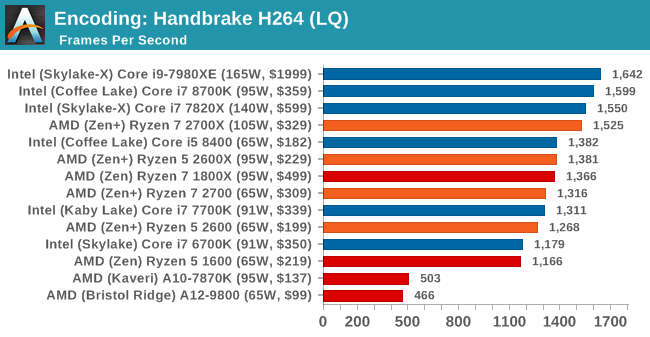
High Quality/Resolution H264: A similar test, but this time we take a ten-minute double 4K (3840x4320) file running at 60 Hz and transcode from Main to High, using the very-fast preset.
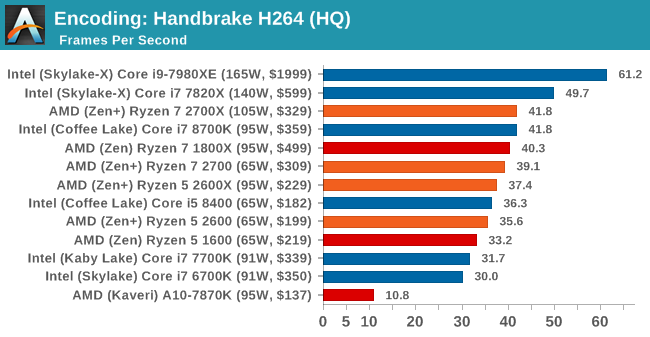
HEVC Test: Using the same video in HQ, we change the resolution and codec of the original video from 4K60 in H264 into 4K60 HEVC.
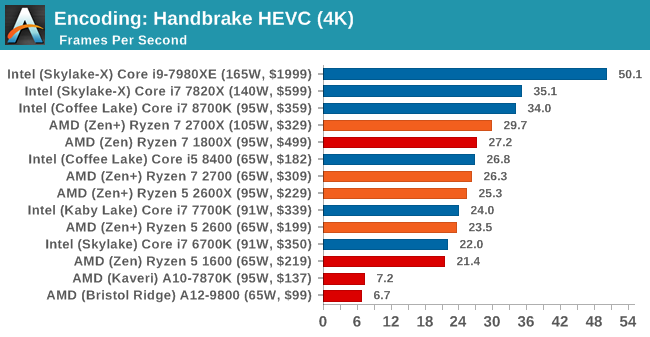
For HandBrake video encoding of large frames, there is a bump with the new Ryzen-2000 series processors over the previous generation, however there is still a gap up to the Core i7-8700K. The Core i5-8400 puts in a good showing here, above all but the best Ryzen parts.










545 Comments
View All Comments
Maxiking - Tuesday, April 24, 2018 - link
"I just finished running Rise of the Tomb Raider benchmarks, 1080p, very high preset, FXAA.Unpatched:
Mountain Peak: 131.48 FPS (min: 81.19 max: 197.02)
Syria: 101.99 FPS (min: 62.73, max: 122.24)
Geothermal Valley: 98.93 FPS (min:76.48, max: 117.00)
Overall score: 111.31 FPS
Windows patch only:
Mountain Peak: 135.34 FPS (min: 38.21 max: 212.84)
Syria: 102.54 FPS (min: 44.22, max: 144.03)
Geothermal Valley: 96.36 FPS (min:41.35, max: 148.46)
Overall score: 111.93 FPS
Windows patch and BIOS update:
Mountain Peak: 134.01 FPS (min: 59.91 max: 216.16)
Syria: 101.68 FPS (min: 38.95, max: 143.44)
Geothermal Valley: 97.55 FPS (min:46.18, max: 143.97)
Overall score: 111.62 FPS
Average framerates don't seem affected."
From the link you posted, you got rekt by yourself.
Ranger1065 - Wednesday, April 25, 2018 - link
Nicely done Mr Aardvark. That made me smile.mikael.skytter - Tuesday, April 24, 2018 - link
Thanks for a great review. Any chance it would be possible to look into how SpeedShift 2 compares to AMD:s solution for short burst loads and clock ramp-up?Thanks!
koekkoe - Tuesday, April 24, 2018 - link
My favorite part in the article: fsfasd.Meow.au - Tuesday, April 24, 2018 - link
I’ve visited the comments section a few times since the publication. As a psychologist in training, I’ve found it interesting as the initial complaints about this review were reasonable (it doesn’t match other sites), but by page 45 are now bordering on paranoia and conspiracy theories. The conspiracy theories are all the more puzzling when the simplest and most reasonable explanation is that the spectre patch has punished Intel processors rather severely. I’ve found trying to argue against conspiracy theories, be it the moon landing or anti-vaxers, to be singularly ineffective.The more you provide scientific evidence and rationality, the harder conspiracy theorists dig in their heels and defend their original position. Our natural confirmatory bias to only seek evidence which confirms pre-existing beliefs seems to be a flaw built into the wiring of the human brain. Psychologically protective? Yes... it’s nice to always be right. Useful for doing science? No.
I’d be delighted (and shocked) in a week’s time to learn of massive incompetence or a cover up. I expect there to be some interesting and unexpected details. But I’m guessing no evidence will be found for the commonly repeated conspiracy theories (spectre effect is minimal, heatsink throttling, bias against intel, etc.). But I guess that will just be further evidence there really is a conspiracy... whatever.
Keep up the good work guys. A long time reader.
RafaelHerschel - Wednesday, April 25, 2018 - link
I think you need more training, psychologist in training, because it seems that you can't detect your own personal bias. As you stated yourself, the original complaints are quite reasonable. The problem is that AnandTech is not addressing these complaints in a timely manner and is mostly interested in damage control.The fact that some complaints are unreasonable doesn't change the fact.
Many other reviewers have applied all relevant patches, it is poor form to assume that they haven't. But I understand why you question their competence or integrity. It's cognitive dissonance. You trust AnandTech. In this case AnandTech is an outlier and has not clarified the unique results of their gaming test. Your trust in AnandTech is therefore not logical, and yet you consider yourself a logical person.
Therefore, you have decided that the 'logical' explanation is that all other reviewers haven't applied the patches... whatever.
divertedpanda - Wednesday, April 25, 2018 - link
Other reviewers admitted having not patched down to the bios since some used mobos where patches were not yet released.TrackSmart - Thursday, April 26, 2018 - link
This comment by RafaelHerschel doesn't make sense. The person being maligned said exactly this: "I expect there to be some interesting and unexpected details. But I’m guessing no evidence will be found for the commonly repeated conspiracy theories..."And he/she was EXACTLY CORRECT in that prediction.
Your complaint, on the other hand, seems disingenuous. Anandtech's staff immediately flagged their gaming results as anomalous (on just about every page of the article). Then they dug deep to figure out what happened, which takes time to test, confirm, and then publish about). Then about 5 days later they posted updated results (2700x and i7-8700k, so far) and a VERY DETAILED explanation of what happened.
So.... What's the problem again? That sometimes unforeseen test parameters can lead to different results? That can happen. The only question is how was the situation handled. In this case, I think reasonably well under the circumstances.
mapesdhs - Monday, May 14, 2018 - link
Grud knows now what "timely manner" is supposed to mean these days. Perhaps RafaelHerschel would only be happy if AT can go back in time and change the article before it's published.Meow.au, re what you said, Stefan Molyneux has some great pieces on these issues on YT.
schlock - Tuesday, April 24, 2018 - link
Why aren't we running DDR4-3200 across all systems? It may go a small ways to explaining the small discrepancy in intel performance ...